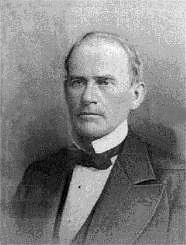Gove Saulsbury
Gove Saulsbury (born May 29, 1815 in Kent County , Delaware , † July 31, 1881 in Dover , Delaware) was an American politician and governor of the state of Delaware from 1865 to 1871 .
Early years and political advancement
After elementary school, Gove Saulsbury studied at Delaware College , now the University of Delaware , and then until 1842 at the University of Pennsylvania medicine. After working as a teacher for some time, he settled in Dover as a practicing doctor. In 1861 he became President of the Delaware Medical Society.
Gove Saulsbury was a member of the Democratic Party . Until 1862 he was not politically active. In that year he was elected to the Delaware Senate, whose president he was to become from 1864. In this capacity, he had to take over from the late Governor William Cannon from March 1, 1865 . Saulsbury initially ended Cannon's tenure and was elected to this office for another four years in 1866. Thus he was governor of his state until January 17, 1871.
Delaware Governor
The American Civil War ended during Saulsbury's tenure . For Delaware, this also meant that the returning soldiers had to be reintegrated into society and that the war invalids and the relatives of the dead had to be cared for. In addition to dealing with the consequences of the war, the expansion of the railway network was pushed ahead and some new tax laws were passed, according to which real estate agents, insurance companies and auctioneers were also liable to tax. One person in each district has been assigned to oversee the implementation of these regulations.
In Delaware, the position of the Democrats and their governor was unchallenged. With this majority they defied the republican federal government. The end of slavery and the subsequent amendments to the US Constitution were strictly opposed . It was not until 1901 that the 13th Amendment , which abolished slavery, was ratified by Delaware. Delaware, despite being on the Union side during the Civil War, took a very racist position. Not much should change that in the decades after Governor Saulsbury.
Another résumé
In 1873, Gove Saulsbury was a co-founder of Wesley College in Dover. In the years 1876 and 1880 he was a delegate at the respective Democratic National Conventions . In 1870 he applied unsuccessfully for a seat in the US Senate , which his brother Willard (1820-1892) held at that time . He had been exercising his mandate since 1859 and had an alcohol problem at that time. Gove Saulsbury failed in this venture because of another brother named Eli (1817-1893), who won the election and took Willard's seat. With Willard's son Willard Jr. (1861–1927), another family member was to move into the US Senate between 1913 and 1919.
After Gove Saulsbury's congressional candidacy failed, he returned to work as a doctor. He died in 1881. Gove Saulsbury had five children with his wife, Rosina Jane Smith.
literature
- Robert Sobel and John Raimo (Eds.): Biographical Directory of the Governors of the United States, 1789–1978. Volume 1, Meckler Books, Westport, 1978. 4 volumes.
Web links
- Gove Saulsbury at the National Governors Association (English)
- The governors of Delaware (English)
- The Political Graveyard (English)
- Gove Saulsbury in the database of Find a Grave (English)
| personal data | |
|---|---|
| SURNAME | Saulsbury, Gove |
| BRIEF DESCRIPTION | American politician |
| DATE OF BIRTH | May 29, 1815 |
| PLACE OF BIRTH | Kent County , Delaware |
| DATE OF DEATH | July 31, 1881 |
| Place of death | Dover , Delaware |

